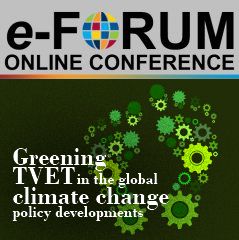
The UNESCO-UNEVOC International Centre: Who We Are | What We Do | Working With Us | Get in Touch
The UNEVOC Network: Learn About the Network | UNEVOC Network Directory
For Members: UNEVOC Centre Dashboard
Thematic Areas: Inclusion and Youth | Digital Transformation | Private Sector Engagement | SDGs and Greening TVET
Our Key Programmes & Projects: BILT: Bridging Innovation and Learning in TVET | Building TVET resilience | TVET Leadership Programme | WYSD: World Youth Skills Day
Past Activities: COVID-19 response | i-hubs project | TVET Global Forums | Virtual Conferences | YEM Knowledge Portal
Our Services & Resources: Publications | TVET Forum | TVET Country Profiles | TVETipedia Glossary | Innovative and Promising Practices | Toolkits for TVET Providers | Entrepreneurial Learning Guide
Events: Major TVET Events | UNEVOC Network News

Introduction | Messages | Participants
 In the next edition of UNESCO-UNEVOC’s virtual conferences, we would like to discuss with you Greening technical and vocational education and training (TVET) in the context of global climate change policy developments. The conference will take place from 2 to 13 November 2015 on the UNESCO-UNEVOC e-Forum.
In the next edition of UNESCO-UNEVOC’s virtual conferences, we would like to discuss with you Greening technical and vocational education and training (TVET) in the context of global climate change policy developments. The conference will take place from 2 to 13 November 2015 on the UNESCO-UNEVOC e-Forum.
Background
The effects of climate change on countries is driving collective action to formulate green growth agendas, transform economic, social and environmental development goals and pass critical environment-sensitive targets, bills and legislations that enable the reduction of greenhouse gas emissions. The recently adopted Sustainable Development Goals![]() (SDGs) set the tone for the post-2015 development agenda while the forthcoming 21st Conference of Parties to the United Nations Framework Convention on Climate Change (COP21
(SDGs) set the tone for the post-2015 development agenda while the forthcoming 21st Conference of Parties to the United Nations Framework Convention on Climate Change (COP21![]() ) will convene business, as well as cross-sector players, to develop solutions to cope with the further implications of climate change.
) will convene business, as well as cross-sector players, to develop solutions to cope with the further implications of climate change.
Green skills development will no doubt be influenced and reflect these policy developments – they challenge TVET to expand quality skills provisions and ensure skills relevance not only for the world of work but also to support lifelong learning, inclusion and economies’ and societies’ low-carbon transitions.
But what does this transformation entail? The virtual conference will consider global frameworks and agreements of the UN Summit 2015 in New York and to be made at COP21 in Paris as they challenge TVET to expand quality skills provision and to ensure skills relevance not only for the world of work but also to support lifelong learning, inclusion and low-carbon transitions of economies and societies. The aim is to promote focused discussions on crucial themes in TVET development and to gather valuable input from the e-Forum community.
With an emphasis on action-oriented outcomes, the conference report will provide an extra impetus heading into COP21 and will seek to define TVET’s transformative role in developed, as well as developing countries. Far from seeking to promote a ‘one size fits all’ outlook, this conference hopes to empower TVET experts and stakeholders to recognise opportunities in their respective countries and regions and inform them on topics such as:
The virtual conference will be moderated by Dr Nick Sofroniou, Principal Research Fellow at Institute for Employment Research of the University of Warwick and an expert in green skills development. Nick has significant experience in policy-relevant research and analysis on education, training and skills and has worked as an expert in socio-economic research and analysis at Cedefop, the European Union agency for the development of vocational education and training (VET). During that time, he also represented the EU on the Interagency Working Group on Greening TVET.